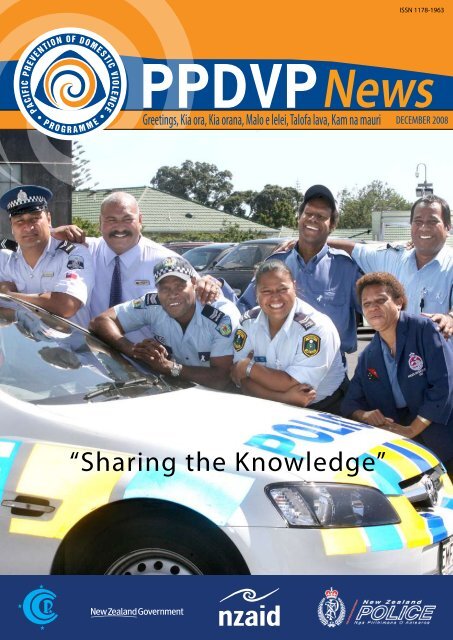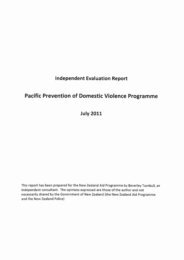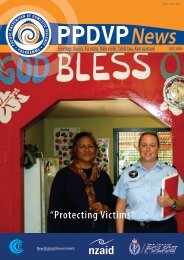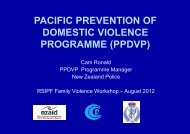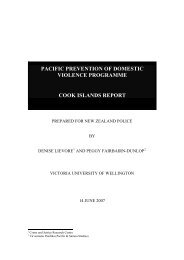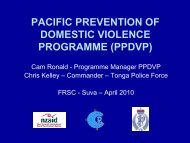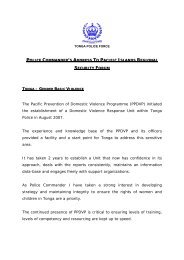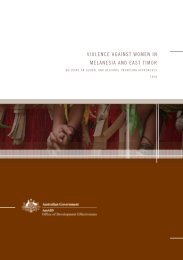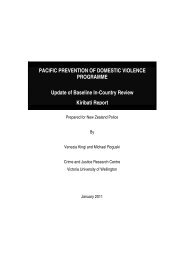“Sharing the Knowledge” - Pacific Prevention of Domestic Violence ...
“Sharing the Knowledge” - Pacific Prevention of Domestic Violence ...
“Sharing the Knowledge” - Pacific Prevention of Domestic Violence ...
You also want an ePaper? Increase the reach of your titles
YUMPU automatically turns print PDFs into web optimized ePapers that Google loves.
ISSN 1178-1963<br />
News<br />
DECEMBER 2008<br />
<strong>“Sharing</strong> <strong>the</strong> <strong>Knowledge”</strong>
Programme update<br />
Welcome to ano<strong>the</strong>r edition <strong>of</strong> <strong>the</strong> PPDVP News. It has become<br />
a bit <strong>of</strong> a best seller as we now distribute over 500 copies around<br />
<strong>the</strong> region.<br />
The PPDVP has started to work with <strong>the</strong> Vanuatu Police Force<br />
who have joined <strong>the</strong> programme as a participating country.<br />
We have included a “bio” for <strong>the</strong> new Vanuatu mentor,<br />
Alan McGlade <strong>of</strong> Hamilton. We also welcome an additional<br />
reserve mentor, Sue O’Neill, from <strong>the</strong> Central Police District in<br />
New Zealand. You will see that <strong>the</strong>y both have a wide range<br />
<strong>of</strong> experience that enhances our overall skills base for <strong>the</strong><br />
programme. Welcome to Alan and Sue.<br />
The Case Management and Intelligence System (CMIS) database<br />
from Jade S<strong>of</strong>tware is in place in a number <strong>of</strong> countries and going<br />
well. The take-up by staff has been excellent and <strong>the</strong>ir knowledge<br />
<strong>of</strong> <strong>the</strong> number and range <strong>of</strong> domestic violence cases is increasing<br />
through <strong>the</strong> use <strong>of</strong> this tool. The Cook Islands Police are using<br />
it throughout <strong>the</strong>ir police service and <strong>the</strong> overall feedback from<br />
<strong>the</strong>m has been excellent.<br />
This edition includes an article about <strong>the</strong> annual DV training<br />
course, which was held in Tonga in June. The focus was around<br />
investigating reports <strong>of</strong> domestic violence and ga<strong>the</strong>ring <strong>the</strong><br />
best possible evidence to support <strong>the</strong> prosecution <strong>of</strong> <strong>of</strong>fenders.<br />
The <strong>Pacific</strong> Islands Chiefs <strong>of</strong> Police (PICP) met in Samoa in<br />
September. The PICP continue to <strong>of</strong>fer <strong>the</strong>ir support to <strong>the</strong><br />
PPDVP, and we have seen some clear instances <strong>of</strong> this. In PNG, <strong>the</strong><br />
Commissioner has taken a firm line on cases where his staff have<br />
assaulted <strong>the</strong>ir partners and we congratulate him on this. A group<br />
<strong>of</strong> <strong>the</strong> Micronesian Chiefs <strong>of</strong> Police have asked for assistance.<br />
This will be assessed and hopefully occur early next year.<br />
In November, we will join with <strong>the</strong> <strong>Pacific</strong> Islands Law Officers<br />
Network (PILON) and NZ Crown Law who facilitate an annual<br />
training course for prosecutors in litigation skills. The course now<br />
includes a DV component using material from <strong>the</strong> investigations<br />
course syllabus. Five police prosecutors will attend <strong>the</strong> training<br />
in Vanuatu. We are also planning a basic prosecutions training<br />
course for about eight police prosecutors in April or May next<br />
year in Auckland. The NZ Police Prosecutions Service is working<br />
with <strong>the</strong> PPDVP on this.<br />
A senior investigator from Papua New Guinea spent ten days<br />
in Auckland on a domestic and family violence study tour.<br />
This edition includes some extracts from his report, and <strong>the</strong><br />
lessons he learnt. It was a very useful tour and one that we will<br />
look to repeat.<br />
The PPDVP Team <strong>of</strong>fers you all our best wishes for <strong>the</strong> end <strong>of</strong> <strong>the</strong><br />
year and <strong>the</strong> Christmas and festive seasons, and we hope that<br />
you have some quality time with your families and friends.<br />
Cam Ronald<br />
2<br />
Cover Photo: <strong>Pacific</strong> participants attending <strong>the</strong> Auckland Study tour<br />
in November 2008. Photo: John Selkirk, Dominion Post.<br />
Understanding<br />
<strong>the</strong> <strong>Pacific</strong><br />
The New Zealand Police<br />
Commissioner recently commented<br />
on <strong>the</strong> challenges <strong>of</strong> policing <strong>the</strong><br />
pacific. Commissioner Howard<br />
Broad spoke <strong>of</strong> providing assistance<br />
Cam Ronald<br />
to o<strong>the</strong>r police services, and<br />
he noted “Inevitably, <strong>the</strong> first step is to develop <strong>the</strong> trust and<br />
confidence between donor and recipient - that is <strong>the</strong> basis <strong>of</strong> all<br />
human interactions.”<br />
“When I sit down and talk with my counterparts from across <strong>the</strong><br />
<strong>Pacific</strong>, once I have <strong>the</strong>ir confidence that I understand <strong>the</strong>m as<br />
human beings, that we have <strong>of</strong>fered each o<strong>the</strong>r <strong>the</strong> respect due<br />
each o<strong>the</strong>r, and this includes overcoming an inherent shyness on <strong>the</strong><br />
part <strong>of</strong> <strong>Pacific</strong> people, <strong>the</strong>y have plenty to say about <strong>the</strong>ir needs. “<br />
The Commissioner concluded his commentary with “Sometimes<br />
going to places like Samoa, <strong>the</strong> Solomons, Timor Leste and<br />
Rarotonga points out to us that regardless <strong>of</strong> <strong>the</strong> operating<br />
environment <strong>the</strong> principles <strong>of</strong> decent policing are <strong>the</strong> same.”<br />
These comments struck a chord with <strong>the</strong> various activities that<br />
make up <strong>the</strong> PPDVP. At <strong>the</strong> recent <strong>Pacific</strong> Islands Chiefs <strong>of</strong> Police<br />
(PICP) meeting in Samoa a group <strong>of</strong> <strong>the</strong> Micronesian chiefs <strong>of</strong> police<br />
raised <strong>the</strong> need for support around domestic violence knowledge,<br />
understanding and training in <strong>the</strong>ir three countries. Each has<br />
diverse needs but <strong>the</strong> underlying <strong>the</strong>me is that <strong>the</strong>y wish to do <strong>the</strong><br />
best for <strong>the</strong>ir people, and to deal with <strong>the</strong>se crimes and <strong>the</strong> harm<br />
<strong>the</strong>y cause.<br />
Providing assistance to <strong>the</strong> countries in Micronesia is no simple<br />
matter - most <strong>of</strong> <strong>the</strong>m are at least two days travel from New Zealand,<br />
<strong>of</strong>ten meaning up to four “sometimes connecting” flights each way,<br />
and <strong>the</strong> countries <strong>the</strong>mselves are mostly made up <strong>of</strong> a series <strong>of</strong><br />
small communities on scattered islands. The PPDVP will listen to <strong>the</strong><br />
local police, discuss <strong>the</strong>ir problems and see how we can help <strong>the</strong>m<br />
over <strong>the</strong> next few months.<br />
At <strong>the</strong> time that this edition <strong>of</strong> <strong>the</strong> PPDVP News reaches you, a<br />
series <strong>of</strong> gender based violence surveys in <strong>the</strong> Solomon Islands and<br />
Kiribati will have been released. The picture painted in <strong>the</strong>se two<br />
surveys is not a pretty one with extremely high levels <strong>of</strong> violence,<br />
both physical and sexual, committed against women by <strong>the</strong>ir<br />
partners and within <strong>the</strong>ir communities. These surveys will bring a<br />
spotlight on to <strong>the</strong> pacific. The PPDVP is responding to identify ways<br />
in which we assist <strong>the</strong> local police to reduce harm to <strong>the</strong> victims,<br />
<strong>the</strong>ir families and society.<br />
The programme welcomes any comments/contributions<br />
to <strong>the</strong> newsletter. If you wish to make comment,<br />
please direct to Kim Woon (Support Officer, PPDVP),<br />
Level 4 - PPDVP / ISG New Zealand Police Headquarters,<br />
180 Molesworth Street, Wellington, New Zealand or<br />
email kim.woon@police.govt.nz DDI 64 4 4707373,<br />
Cell 64 021 224 3526. Fax: 64 4 4749540.
Farewell to old friends and Welcome to New Members<br />
The Programme acknowledges <strong>the</strong> work <strong>of</strong> past members and<br />
welcomes its newest members:<br />
Assistant Chief Inspector Lutoviko Manu formally <strong>the</strong> head <strong>of</strong> <strong>the</strong><br />
Tonga Police DV unit, resigned from <strong>the</strong> Tonga Police service earlier<br />
this year. Manu had been with <strong>the</strong> PPDVP since <strong>the</strong> commencement<br />
<strong>of</strong> <strong>the</strong> programme and he was <strong>the</strong>refore very much one <strong>of</strong> “our team”<br />
across <strong>the</strong> pacific and a key member <strong>of</strong> our overall knowledge group.<br />
He was a key figure in <strong>the</strong> development <strong>of</strong> <strong>the</strong> domestic violence<br />
unit in Tonga and part <strong>of</strong> <strong>the</strong> team that developed <strong>the</strong> first domestic<br />
violence training curriculum delivered to <strong>Pacific</strong> Police in Auckland in<br />
April 2007. We wish him well as he moves on to a new career.<br />
The new <strong>of</strong>ficer in Charge <strong>of</strong> <strong>the</strong> Tonga DV Unit is Detective Sergeant<br />
Seteone Poutele, he is well respected within <strong>the</strong> Tonga Police Service<br />
and brings a wide range <strong>of</strong> skills to <strong>the</strong> position, Seteone was part<br />
<strong>of</strong> <strong>the</strong> team <strong>of</strong> experts from <strong>the</strong> <strong>Pacific</strong> whom ga<strong>the</strong>red in Tonga to<br />
develop <strong>the</strong> Investigative Training Curriculum which was delivered to<br />
<strong>Pacific</strong> Police Officers in Tonga in June 2008.<br />
The programme also wishes to record our thanks to Sergeant Rebecca<br />
Ellis Hoskings formally <strong>the</strong> head <strong>of</strong> <strong>the</strong> Cook Islands domestic violence<br />
unit Rebecca, like Manu in Tonga, had been with <strong>the</strong> PPDVP since <strong>the</strong><br />
commencement <strong>of</strong> <strong>the</strong> programme. Rebecca is a well known identity<br />
in <strong>the</strong> Cook Islands and was instrumental in developing partnerships<br />
and opening a number <strong>of</strong> doors for <strong>the</strong> programme in <strong>the</strong> Cook<br />
Islands. Rebecca retains her role as <strong>the</strong> chair <strong>of</strong> <strong>the</strong> Woman’s Advisory<br />
Network (WAN) for woman police <strong>of</strong>ficers in <strong>the</strong> <strong>Pacific</strong> and will be a<br />
great sounding board for <strong>the</strong> new Unit O/C.<br />
Senior Constable Pauline Rangi takes over <strong>the</strong> reigns from Rebecca.<br />
Pauline was part <strong>of</strong> a small team <strong>of</strong> <strong>of</strong>ficers that attended <strong>the</strong> CMIS<br />
database training in April 2008 in Rarotonga run by <strong>the</strong> PPDVP.<br />
New PPDVP Mentors<br />
Sergeant Alan McGlade from Hamilton Police, and Senior Sergeant<br />
Sue O’Neil from Palmerston North Police, have joined <strong>the</strong> PPDVP<br />
programme and are both welcome additions.<br />
Alan McGlade<br />
Alan joined <strong>the</strong> Police in 1992<br />
and was involved at <strong>the</strong> start in<br />
<strong>the</strong> Hamilton Abuse Intervention<br />
Pilot Project, in association with<br />
<strong>the</strong> Police “pro-arrest” practise as<br />
a frontline member. After several<br />
years on frontline sectional work,<br />
he moved to Hamilton East<br />
Community Policing Centre, and<br />
later to Hamilton City and joined Alan McGlade<br />
<strong>the</strong> CIB. He worked on <strong>the</strong> Hamilton<br />
Child Abuse Team (CAT) for <strong>the</strong> next five years, becoming <strong>the</strong> senior<br />
detective and relieving O/C on <strong>the</strong> team on a regular basis. He has<br />
focused on building awareness and educating NGOs and Government<br />
organisations about child abuse and <strong>the</strong> work <strong>of</strong> <strong>the</strong> CAT <strong>of</strong>fice by<br />
preparing and presenting various training programmes, information<br />
leaflets and point <strong>of</strong> contact details. He was relieving O/C CIB at Huntly<br />
for three months before moving onto <strong>the</strong> Waikato Law Enforcement<br />
Team as <strong>the</strong> sole detective and relieving O/C, where he dealt with<br />
burglaries, property <strong>of</strong>fending and drug <strong>of</strong>fences.<br />
In 2005 he became <strong>the</strong> Officer In Charge (O/C) <strong>of</strong> <strong>the</strong> newly launched<br />
Family Safety Team (FST). He is working extensively with government<br />
and non-government agencies building on <strong>the</strong> existing networks,<br />
promoting and educating on Family <strong>Violence</strong>, and striving for best<br />
practise in all areas <strong>of</strong> response to families in crisis. The FST focuses<br />
on providing supervision, guidance and training preparation and<br />
presentation involving all collaborating partners in <strong>the</strong> area <strong>of</strong><br />
Family <strong>Violence</strong>.<br />
Sue O’Neil<br />
Sue joined <strong>the</strong> Police in 1991 and was<br />
posted to Wanganui. She qualified<br />
as a Detective and has worked<br />
on a wide range <strong>of</strong> serious crime<br />
investigations, but her passion is in<br />
<strong>the</strong> area <strong>of</strong> child abuse investigations<br />
and she is a qualified specialist child<br />
interviewer. Sue was promoted to<br />
Sergeant on sectional duties before<br />
becoming a Police prosecutor. After Sue O’Neil<br />
15 years in Wanganui, Sue transferred<br />
to Palmers ton North being promoted to Senior Sergeant in charge <strong>of</strong><br />
Operations. The role included <strong>the</strong> Family <strong>Violence</strong> portfolio, Officer in<br />
Charge <strong>of</strong> Youth, Community Group, Dogs, Briefing Centre and Court<br />
Orderly. Also attached to <strong>the</strong> role were Neighbourhood Support, Ethnic<br />
Communities, Community Patrols, Tertiary and Korowai Kahui (Maori<br />
advisory group). Although extremely challenging, <strong>the</strong> diversity ensured<br />
that it remained interesting. Sue enjoys working with <strong>the</strong> community,<br />
particularly ethnic communities and refugees, which forms a large part<br />
<strong>of</strong> her work. Sue has worked closely with <strong>the</strong> Congolese, Burmese, and<br />
recently <strong>the</strong> Bhutanese, communities.<br />
“I had <strong>the</strong> pleasure <strong>of</strong> traveling to Fiji with Kim, Soni and Alan where<br />
we met with many people from around <strong>the</strong> <strong>Pacific</strong> who work in <strong>the</strong><br />
area <strong>of</strong> Family <strong>Violence</strong>. I was amazed to see <strong>the</strong> number <strong>of</strong> different<br />
agencies and <strong>the</strong> range <strong>of</strong> work that was being carried out. The trip<br />
provided an ideal opportunity for networking and gaining knowledge<br />
<strong>of</strong> what is going on out <strong>the</strong>re. I am looking forward to getting into this<br />
role in PPDVP and working with Police around <strong>the</strong> <strong>Pacific</strong>. I hope <strong>the</strong><br />
experience and knowledge that I have gained over <strong>the</strong> years will be <strong>of</strong><br />
benefit to <strong>the</strong> people <strong>of</strong> <strong>the</strong> <strong>Pacific</strong>”.<br />
3
Regional<br />
Tal<strong>of</strong>a lava, Malo e lelei, Fakal<strong>of</strong>a lahi atu, Nisa bula vinaka, Num estae,<br />
Kia orana, Kia ora tātou and warm <strong>Pacific</strong> greetings.<br />
The PPDVP is a unique programme in <strong>the</strong> sense that what is being<br />
advocated is a whole <strong>of</strong> ‘<strong>Pacific</strong> Policing’ approach to responding to<br />
domestic violence, and having consistent processes and procedures<br />
as well as a common view towards domestic violence being a crime<br />
and not a private matter and while each <strong>Pacific</strong> Policing organisation<br />
will have reached different levels <strong>of</strong> response <strong>the</strong> fact that we have<br />
all reached a level <strong>of</strong> agreement that has led to <strong>the</strong> signing <strong>of</strong> a<br />
Declaration between <strong>Pacific</strong> Police Chiefs against domestic violence, is<br />
a major step forward.<br />
The programme has been privileged to meet and work with many<br />
<strong>of</strong>ficers from o<strong>the</strong>r <strong>Pacific</strong> Police Services, local and Regional NGO’s,<br />
and community organisations. It has shared laughter and understood<br />
<strong>the</strong> tears shed by some very committed and passionate people,<br />
including police <strong>of</strong>ficers who have been moved by a personal<br />
experience or recognised ano<strong>the</strong>rs personal journey, heard stories<br />
told by children and wondered about <strong>the</strong>ir future, marvelled at <strong>the</strong><br />
triumph <strong>of</strong> o<strong>the</strong>rs in trying circumstances, and in <strong>the</strong>ir own success<br />
stories. These experiences have both inspired and motivated <strong>the</strong><br />
programme to move fur<strong>the</strong>r ahead to move this very important issue<br />
forward.<br />
The challenge continues as <strong>the</strong> programme is nearing its third year <strong>of</strong><br />
deployments.<br />
While many well-established non-government agencies and<br />
community organisations in <strong>the</strong> <strong>Pacific</strong> Region have been tackling this<br />
issue for some time, Police agencies around <strong>the</strong> world including <strong>the</strong><br />
<strong>Pacific</strong> region, are steadily continuing to build <strong>the</strong>ir own capacity and<br />
are making good inroads into responding more effectively to reported<br />
incidences <strong>of</strong> domestic violence.<br />
We are now seeing <strong>the</strong> benefits <strong>of</strong> a developed process <strong>of</strong> ga<strong>the</strong>ring<br />
information on domestic violence both within and outside <strong>of</strong> police<br />
organisations. In particular CMIS is being used to better inform police<br />
managers, more arrests are being made, repeat <strong>of</strong>fending identified<br />
and a zero tolerance by <strong>of</strong>ficers towards domestic violence <strong>of</strong>fending.<br />
While <strong>the</strong>se are things that are developed and being developed, we<br />
are seeing attitudes changing, albeit slowly and as Cam (Programme<br />
Manager) keeps saying: “It won’t happen overnight, but it will happen”.<br />
The Regional programmes continue to move forward and we warmly<br />
welcome Vanuatu in joining <strong>the</strong> programme as <strong>the</strong> fifth participating<br />
country and at <strong>the</strong> same time, new mentor Alan McGlade from <strong>the</strong><br />
Hamilton policing region in New Zealand who is assigned to Vanuatu.<br />
Commissioner Patu Lui is a strong advocator for <strong>the</strong> programme and<br />
we are thankful for his continued support as has Mr Jeff Langley (NZ<br />
High Commissioner) to Vanuatu.<br />
The second ‘Train <strong>the</strong> Trainers’ (Investigative) <strong>Domestic</strong> <strong>Violence</strong><br />
curriculum was delivered in Tonga in June this year and is being<br />
consolidated in participating and Link countries. The CMIS database<br />
is getting a good airing, and forms an integral tool for advising local<br />
police services <strong>of</strong> <strong>the</strong> impact <strong>of</strong> DV.<br />
The <strong>Pacific</strong> Island Law Officers<br />
Network (PILON) workshop took<br />
place this year and brought toge<strong>the</strong>r<br />
over 40 lawyers from across <strong>the</strong><br />
<strong>Pacific</strong> to be trained in litigation and<br />
advocacy skills under <strong>the</strong> guiding<br />
hand <strong>of</strong> Robert Lithgow (Chair)<br />
and up to 20 Faculty members<br />
from around <strong>the</strong> <strong>Pacific</strong> as trainers. Inspector Soni Malaulau<br />
For <strong>the</strong> first time in its 14 year history<br />
<strong>of</strong> training pacific lawyers PILLON has included six Police prosecutors<br />
in <strong>the</strong> litigation skills training, The course also now has a domestic<br />
violence component with a domestic violence scenario added as one<br />
<strong>of</strong> <strong>the</strong> ‘fact patterns’. Participants will be trained in a mock courtroom<br />
scenario practising opening and closing remarks, cross examination,<br />
examination in chief and examination <strong>of</strong> expert evidence relating to a<br />
domestic violence prosecution.<br />
We are also now looking at providing assistance to <strong>Pacific</strong> Nations<br />
in <strong>the</strong> Micronesian areas as a result <strong>of</strong> request from <strong>the</strong>m at <strong>the</strong> last<br />
<strong>Pacific</strong> Island Chiefs <strong>of</strong> Police meeting in Samoa.<br />
On <strong>the</strong> local front in NZ, we have seen a PNG Investigator complete<br />
a two-week study tour in Waitakere, Auckland and we currently have<br />
seven <strong>Pacific</strong> Police <strong>of</strong>ficers working in <strong>the</strong> Counties Manukau area,<br />
South Auckland, in full uniform on a two-week study tour. They will<br />
meet local NGO’s and accompany NZ Police <strong>of</strong>ficers on up to three<br />
nights <strong>of</strong> patrol work, observing <strong>the</strong>m attend incidences, including<br />
responding to domestic violence cases. This has already had a<br />
marked effect on <strong>Pacific</strong> Police with feedback on <strong>the</strong> high standard <strong>of</strong><br />
pr<strong>of</strong>essionalism shown by NZ Police <strong>of</strong>ficers.<br />
On an even more local front for me personally, I ready myself to join<br />
<strong>the</strong> Afghanistan contingent to assist New Zealand Police’s efforts<br />
in that region. I commence training in January/February and will<br />
deploy later in <strong>the</strong> year returning towards <strong>the</strong> end <strong>of</strong> <strong>the</strong> 2009.<br />
No! <strong>the</strong> PPDVP programme is not going global although on that front<br />
we have had many request for this programme to be developed not<br />
only in Afghanistan but in o<strong>the</strong>r areas outside <strong>the</strong> <strong>Pacific</strong>. While <strong>the</strong><br />
temptation is <strong>the</strong>re <strong>the</strong> reality is more sobering so as we advocated<br />
right from <strong>the</strong> beginning, small steps, small steps.<br />
In 2009, <strong>the</strong> programme will look at intensifying its programmes<br />
<strong>of</strong> consolidating <strong>the</strong> training within police services, ensuring that<br />
capacity to respond is increased and exploring ways to create and<br />
sustain awareness <strong>of</strong> DV. “Yes we are focused on outcomes but even<br />
more so, on <strong>the</strong> impact that we are having at <strong>the</strong> local level both<br />
within Police services and on <strong>the</strong> community as a whole”<br />
Inspector Soni Malaulau<br />
Regional Coordinator, PPDVP<br />
4
PNG Study Tour – Auckland NZ, September 2008<br />
Papua New Guinea Officer Warmly Welcomed<br />
In August/September 2008, Detective Sergeant Tinol Pakiapon from<br />
<strong>the</strong> Royal Papua New Guinea Constabulary (RPNGC), travelled to<br />
New Zealand for a two-week study tour.<br />
D/Sgt Pakiapon’s visit stemmed from a March 2008 visit to Papua<br />
New Guinea by <strong>the</strong> PPDVP Programme Manager, Cam Ronald.<br />
D/Sgt Pakiapon, <strong>the</strong> <strong>of</strong>ficer in charge <strong>of</strong> a sexual <strong>of</strong>fences and<br />
domestic violence unit in <strong>the</strong> RPNGC, has been part <strong>of</strong> <strong>the</strong> six-person<br />
investigative unit in Boroko, Port Moresby for 14 years. His visit was<br />
funded through <strong>the</strong> PPDVP’s Technical Assistance Fund.<br />
D/Sgt Pakiapon’s New Zealand study tour enabled him to spend<br />
time with NZ Police <strong>Domestic</strong> <strong>Violence</strong> Unit, Sexual and Child Sexual<br />
Offence investigators, as well as being introduced to <strong>the</strong> wide range<br />
<strong>of</strong> women’s rights and victim support groups within <strong>the</strong> Waitematā<br />
Police District. He was warmly welcomed by all.<br />
S/Sgt Marty Edghill, on temporary assignment to <strong>the</strong> PPDVP, and S/Sgt<br />
Dave Ryan, a PPDVP mentor based in Waitematā, managed <strong>the</strong> twoweek<br />
study tour, including a wide range <strong>of</strong> activities in <strong>the</strong> Waitematā<br />
Police District, and excursions fur<strong>the</strong>r a field to make <strong>the</strong> most <strong>of</strong> <strong>the</strong><br />
opportunity to meet key stakeholders. Two <strong>of</strong> <strong>the</strong> highlights for D/Sgt<br />
Pakiapon were his attendance at a ‘White Ribbon’ planning meeting<br />
and a day trip to Hamilton with <strong>the</strong> new mentor to Vanuatu, Sergeant<br />
Alan McGlade, for an overview <strong>of</strong> domestic violence procedures in<br />
that Policing District.<br />
Since returning to PNG, D/Sgt Pakiapon has submitted a full report<br />
on <strong>the</strong> study tour to his Commissioner <strong>of</strong> Police and <strong>the</strong> PPDVP.<br />
He returned to Papua New Guinea leaving all with <strong>the</strong> clear message<br />
that <strong>the</strong> secondment had been very much a learning experience,<br />
enhancing his knowledge <strong>of</strong> <strong>the</strong> value <strong>of</strong> a pr<strong>of</strong>essional and respectful<br />
approach to both work and <strong>the</strong> community, and at <strong>the</strong> same time<br />
increasing his knowledge and understanding <strong>of</strong> <strong>the</strong> New Zealand<br />
approach to gender-based violence. In his own words, D/Sgt Pakiapon<br />
described various aspects <strong>of</strong> <strong>the</strong> Study Tour as follows:<br />
“One thing that hooked me was to see all <strong>the</strong>se NZ Police woman and<br />
men in <strong>the</strong>ir full uniforms especially for night shifts. Everyone is <strong>the</strong>re on<br />
time for work, on patrol on <strong>the</strong> roads, quick response to calls, especially<br />
by front line police, and sober attitudes when reporting for duty”<br />
“During this trip I had to pause and reflect on <strong>the</strong> very important role<br />
I play back at home as a policeman accountable to <strong>the</strong> Police and to<br />
<strong>the</strong> members <strong>of</strong> <strong>the</strong> public I swore to serve”<br />
“If I can respect myself, I will have no problems at all respecting o<strong>the</strong>r<br />
people and <strong>the</strong>ir properties. This is what I learnt and it is very valuable to<br />
me. I will be passing <strong>the</strong>se values on to <strong>the</strong> men and woman under me”.<br />
“This has re-enforced <strong>the</strong> need to identify police personnel for<br />
domestic violence training through <strong>the</strong> PPDVP, and for personnel<br />
to undergo specialist training in NZ or bring experts in to train staff.<br />
This programme should be an on-going thing for more RPNGC<br />
members’ participation”.<br />
Detective Sergeant Pakiapon was extremely appreciative <strong>of</strong> <strong>the</strong> way<br />
he was received by all staff. The study tour was his first experience<br />
outside Papua New Guinea and a truly meaningful activity for him.<br />
The study tour is a continuation <strong>of</strong> <strong>the</strong> excellent relationships<br />
developed between <strong>the</strong> PPDVP and <strong>the</strong> RPNGC.<br />
Inspector Soni Malaulau<br />
Regional Co-ordinator<br />
D/Sgt Pakiapon with Senior Constable Glen Compain <strong>of</strong> Auckland Police.<br />
PPDVP and PILON Litigation Skills Programme 2008<br />
In December 2008, <strong>the</strong> <strong>Pacific</strong> Island Law Officers Network (PILON) Litigation Skills Programme will be delivered at <strong>the</strong> University <strong>of</strong> South<br />
<strong>Pacific</strong>, Emalus Campus in Port Vila. This is <strong>the</strong> 7th programme funded by NZAID and brings toge<strong>the</strong>r 40 <strong>Pacific</strong> government legal personnel<br />
with Judges, Queen’s Counsel and senior members <strong>of</strong> <strong>the</strong> legal fraternity <strong>of</strong> New Zealand and <strong>the</strong> <strong>Pacific</strong> region as <strong>the</strong> teaching faculty. The<br />
programme is designed to provide continuous learning and to improve <strong>the</strong> practical court advocacy and litigations skills <strong>of</strong> <strong>the</strong> participants.<br />
PPDVP and <strong>the</strong> New Zealand Crown Law Office are excited about <strong>the</strong> cooperative approach, sharing <strong>of</strong> knowledge and “leveraging”<br />
between <strong>the</strong> two parties. “For <strong>the</strong> first time, six senior Police Prosecutors from <strong>the</strong> various PPDVP participating countries will be attending<br />
and receiving <strong>the</strong> benefit <strong>of</strong> this litigation skills programme,” says Donna Llewell.<br />
As well, PPDVP and <strong>the</strong> Crown Law Office have worked toge<strong>the</strong>r in recent months on <strong>the</strong> development <strong>of</strong> a domestic violence scenario<br />
in a <strong>Pacific</strong> context to add a new dimension to <strong>the</strong> programme case file and materials. PPDVP personnel will also present a general<br />
awareness and interactive session about <strong>the</strong> challenges <strong>of</strong> domestic violence in <strong>the</strong> <strong>Pacific</strong> region.<br />
5
CMIS Database<br />
Meeting <strong>the</strong> needs for data, on time and under budget!!<br />
It is not <strong>of</strong>ten that this can be said <strong>of</strong> a new computer<br />
system, but <strong>the</strong> success <strong>of</strong> <strong>the</strong> installation <strong>of</strong> <strong>the</strong> Case<br />
Management and Intelligence System (CMIS) into <strong>the</strong> <strong>Pacific</strong><br />
DV <strong>of</strong>fices has been just that.<br />
CMIS, now retagged as "Jade Investigator", was a tried and<br />
trusted system that was used in <strong>the</strong> <strong>Pacific</strong> Trans-national<br />
Crime Network. The PPDVP needed a way to record <strong>the</strong> cases<br />
being reported to <strong>the</strong> DV <strong>of</strong>fices, and to ga<strong>the</strong>r information<br />
on <strong>the</strong> trends and patterns around domestic violence.<br />
Everyone knew that domestic violence is an under-reported<br />
crime, and that it is <strong>of</strong>ten hidden within families, villages<br />
and <strong>the</strong> community. On top <strong>of</strong> that, <strong>Pacific</strong> Police services<br />
have recorded past cases in a variety <strong>of</strong> ways, for example,<br />
drunken incidents, threats, or "police help required," and this<br />
only added to <strong>the</strong> lack <strong>of</strong> good data about <strong>the</strong> problem.<br />
Jade S<strong>of</strong>tware Corporation <strong>of</strong> Christchurch, New Zealand,<br />
<strong>of</strong>fered <strong>the</strong>ir CMIS database as a solution to <strong>the</strong> need for<br />
better information management and after some minor<br />
modifications to develop a specific DV-related entry screen,<br />
<strong>the</strong> database was tested, staff were trained, and CMIS was<br />
installed in <strong>the</strong> Cook Islands, Tonga, Samoa and Niue in April<br />
2008. The database has subsequently been installed in <strong>the</strong><br />
Solomon Islands, Kiribati and Tuvalu. The Cook Islands Police<br />
have extended its use to all <strong>of</strong>fence and incident reporting<br />
in <strong>the</strong>ir Police service by <strong>the</strong> purchase <strong>of</strong> fur<strong>the</strong>r copies,<br />
and <strong>the</strong> Niue Police are also using it for all <strong>of</strong> <strong>the</strong>ir <strong>of</strong>fence<br />
reporting.<br />
CMIS allows for details <strong>of</strong> all reported cases to be analysed<br />
from a number <strong>of</strong> views. Not only can <strong>the</strong> full range <strong>of</strong><br />
data be accessed to see trends and areas where special<br />
attention can be paid in repeat cases to prevent fur<strong>the</strong>r<br />
violence, but detailed analysis can be made <strong>of</strong> <strong>the</strong> time <strong>of</strong><br />
day, <strong>the</strong> village where <strong>the</strong> incident occurred, and a range<br />
<strong>of</strong> factors can be identified such as alcohol, weapons and<br />
injuries. This allows DV staff to become proactive and to be<br />
on duty when <strong>the</strong> cases are likely to occur. It also lets <strong>the</strong>m<br />
describe to <strong>the</strong>ir bosses what cases <strong>the</strong>y are working on and<br />
to analyse <strong>the</strong> results, such as how many cases <strong>of</strong> each type<br />
have been reported, and how many have been referred for<br />
investigation and prosecution.<br />
Programme Manager, Cam Ronald, has seen some excellent<br />
use <strong>of</strong> <strong>the</strong> database, with staff extracting data into charts,<br />
creating pr<strong>of</strong>iles <strong>of</strong> families at risk, and targeting repeat<br />
<strong>of</strong>fenders identified through <strong>the</strong> database before <strong>the</strong>y cause<br />
fur<strong>the</strong>r harm. "I am especially impressed with how some <strong>of</strong><br />
<strong>the</strong> young police staff have taken to using CMIS – <strong>the</strong>y are<br />
really working <strong>the</strong> system to get <strong>the</strong> best use <strong>of</strong> it," Cam said.<br />
Cam Ronald<br />
Programme Manager<br />
Study Tour – Auckland NZ,<br />
November 2008:(From Cover Page)<br />
The PPDVP has developed a network <strong>of</strong> <strong>Pacific</strong> Police <strong>of</strong>ficers<br />
who belong to <strong>the</strong> <strong>Pacific</strong> Island Chiefs <strong>of</strong> Police Forum countries<br />
involved in <strong>the</strong> investigation <strong>of</strong> domestic violence. In April<br />
2007, representatives from 13 <strong>Pacific</strong> countries attended a<br />
‘Train <strong>the</strong> Trainers’ seminar in Auckland, which was organised by<br />
<strong>the</strong> PPDVP to look at <strong>the</strong> <strong>the</strong>ory and models behind domestic<br />
violence.<br />
In June 2008, 35 <strong>of</strong>ficers representing 12 <strong>Pacific</strong> Island countries<br />
attended <strong>the</strong> PPDVP ‘Train <strong>the</strong> Trainers’ seminar in Tonga that<br />
focused on <strong>the</strong> investigation <strong>of</strong> domestic violence. Following <strong>the</strong><br />
training, <strong>the</strong> benefits <strong>of</strong> <strong>Pacific</strong> Police <strong>of</strong>ficers working toge<strong>the</strong>r<br />
and learning from each o<strong>the</strong>r’s experiences, was fur<strong>the</strong>r<br />
discussed, resulting in <strong>the</strong> PPDVP providing an opportunity for<br />
eight <strong>of</strong>ficers on short term attachments, to visit New Zealand<br />
and be attached to NZ Police DV and sexual abuse units, to work<br />
with DV co-ordinators and investigators examining NZ police<br />
systems, processes, policy and procedure.<br />
As this magazine goes to print, <strong>the</strong>re are seven <strong>Pacific</strong> Police<br />
<strong>of</strong>ficers from Tonga, Samoa, PNG, Nauru and Vanuatu currently<br />
working in South Auckland on a two-week study tour to looking<br />
at how <strong>the</strong> New Zealand Police approach/respond to domestic<br />
violence. Officers from PPDVP, Howick, Papakura, Otahuhu,<br />
Manurewa and Waitakere are all involved in facilitating <strong>the</strong> study<br />
Tour. "All <strong>Pacific</strong> Police staff will be wearing <strong>the</strong>ir country Police<br />
uniform. This study tour will be an ideal opportunity between<br />
New Zealand Police and <strong>Pacific</strong> Police <strong>of</strong>ficers, for 'shared'<br />
learning on how each country approaches this very important<br />
issue and identifies solutions,” says Inspector Malaulau,<br />
The next PPDVP issue will have a post-study tour report.<br />
<strong>Pacific</strong> Police members on study tour in South Auckland (from left to right)<br />
Eria Morei (Kiribati), Cathy Rimbao (PNG), Seteone Poutele (Tonga),<br />
Alphonse vagone (PNG), Moefetu Iosefo (Samoa), Samuel Jeffrey (Vanuatu),<br />
Sheeva Cook (Nauru)<br />
Photo: John Selkirk, Dominion Post.<br />
6
Participating Countries<br />
Tonga<br />
The <strong>Domestic</strong> <strong>Violence</strong> Unit in Nuku’al<strong>of</strong>a is increasing its Police capacity<br />
in leaps and bounds, even though <strong>the</strong>re have been a few set backs in<br />
<strong>the</strong> last year; <strong>the</strong> main one being <strong>the</strong> resignation <strong>of</strong> <strong>the</strong> Officer in Charge<br />
<strong>of</strong> <strong>the</strong> unit, ACIP Manu. The Programme wishes Manu well for <strong>the</strong> future<br />
and thanks him for his excellent work and leadership <strong>of</strong> <strong>the</strong> Unit. The<br />
Tonga Police Force has appointed Detective Sergeant Seteone Poutele<br />
to fill that role. I look forward to working with D/S Seteone Poutele on<br />
<strong>the</strong> PPDVP and wish him well with his appointment.<br />
D/S Seteone Poutele’s appointment marked a place in <strong>the</strong> Tonga<br />
Police Force history, as it was <strong>the</strong> first time that a vacancy has been<br />
advertised internally and interested candidates were able to apply for<br />
<strong>the</strong> position.<br />
The new appointment process coincided with Commander Chris<br />
Kelly commencing his position in Tonga on 15 September 2008. I was<br />
fortunate enough to be “in country” at <strong>the</strong> time <strong>of</strong> Commander Kelly’s<br />
arrival in Tonga. Even though Commander Kelly was extremely busy<br />
during his first week “on <strong>the</strong> job” he made time to see me and I was<br />
able to give him a briefing on <strong>the</strong> progress <strong>of</strong> <strong>the</strong> <strong>Domestic</strong> <strong>Violence</strong><br />
Unit. Commander Kelly assured me that he was fully behind <strong>the</strong><br />
future progress and success <strong>of</strong> <strong>the</strong> <strong>Domestic</strong> <strong>Violence</strong> Unit.<br />
Before D/S Seteone Poutele’s appointment, <strong>the</strong>re were a few months<br />
where Sergeant Peleki and Corporal Hinemoa held <strong>the</strong> unit toge<strong>the</strong>r<br />
and ensured that it remained fully functioning, even though <strong>the</strong>y<br />
were understaffed. I would like to acknowledge <strong>the</strong> hard work and<br />
dedication <strong>the</strong>y have shown and I believe both have <strong>the</strong> dedication<br />
and are developing <strong>the</strong> capability <strong>of</strong> being <strong>the</strong> Officer in Charge <strong>of</strong> <strong>the</strong><br />
unit in <strong>the</strong> future.<br />
The past year has flown by and a lot<br />
has been achieved by <strong>the</strong> <strong>Domestic</strong><br />
<strong>Violence</strong> Unit. The database which<br />
captures vital domestic violence<br />
statistics is up and running and<br />
<strong>the</strong> unit has recorded over 350<br />
complaints since its opening in June Detective Hayley Ryan<br />
2007. The unit has also concentrated on<br />
developing partnerships with o<strong>the</strong>r domestic violence service providers.<br />
Tonga’s <strong>Domestic</strong> <strong>Violence</strong> Unit recognises that <strong>the</strong> problem cannot<br />
be solved by any one agency and we all must work toge<strong>the</strong>r to make<br />
Tonga a safe place for families to be. In particular, a great relationship<br />
between <strong>the</strong> <strong>Domestic</strong> <strong>Violence</strong> Unit and <strong>the</strong> National Centre <strong>of</strong> Women<br />
and Children has developed. Both agencies are meeting weekly to<br />
discuss <strong>the</strong> week’s reported domestic violence incidents, and ensure<br />
that victims and children are receiving wrap-around support.<br />
In June 2008, Tonga hosted <strong>the</strong> PPDVP Investigative Training Workshop,<br />
which was attended not only by representatives from each <strong>of</strong> <strong>the</strong><br />
programmes participating countries, but from o<strong>the</strong>r nations throughout<br />
<strong>the</strong> <strong>Pacific</strong>. Thirteen <strong>Pacific</strong> Nations Police services were represented<br />
by up to 40 staff at <strong>the</strong> workshop. Not only did <strong>the</strong> participants learn a<br />
great number <strong>of</strong> skills, but it also enabled all Police Officers working in<br />
<strong>the</strong> <strong>Domestic</strong> <strong>Violence</strong> area who attended to get to know each o<strong>the</strong>r,<br />
“bounce” ideas <strong>of</strong>f one ano<strong>the</strong>r and learn from each o<strong>the</strong>rs experiences.<br />
As I have said earlier in this article <strong>the</strong> Tonga <strong>Domestic</strong> <strong>Violence</strong> Unit<br />
has had its setbacks since <strong>the</strong> time that <strong>the</strong> PPDVP commenced in<br />
<strong>the</strong> <strong>Pacific</strong>, but I am proud to say that <strong>the</strong> unit is progressing and it is<br />
doing some great work in keeping victims safe.<br />
Detective Hayley Ryan<br />
Tonga Mentor<br />
Investigative <strong>Domestic</strong> <strong>Violence</strong> Curriculum: Tonga June 2008<br />
The investigative domestic violence curriculum was delivered in June 2008 to 35 Police staff from 13 <strong>Pacific</strong> countries. The venue was<br />
<strong>the</strong> Council <strong>of</strong> Churches conference facility which proved to be a huge success. The facilities were just what we wanted says Inspector<br />
Malaulau, PPDVP Regional co-ordinator. We were also able to use some <strong>of</strong> <strong>the</strong> rooms upstairs for break out activities and practical<br />
exercises such as crime scene examination and practical attendance at a mock domestic violence incident.<br />
The training course was <strong>of</strong>ficially opened by <strong>the</strong> Police Minister and <strong>the</strong><br />
NZ High Commissioner also attended <strong>the</strong> opening ceremony.<br />
Attendees had a refresher course on <strong>the</strong> dynamics and <strong>the</strong> <strong>the</strong>ory<br />
behind <strong>the</strong> causes <strong>of</strong> domestic violence before being taken through<br />
<strong>the</strong> key principles <strong>of</strong> investigating domestic violence and investigative<br />
techniques and skills. Towards <strong>the</strong> end <strong>of</strong> <strong>the</strong> training, <strong>the</strong> practical<br />
exercises, where participants put into practice what <strong>the</strong>y had learnt,<br />
provided assessment <strong>of</strong> <strong>the</strong> training. Says Malaulau; “It is always hard<br />
for Police <strong>of</strong>ficers to perform in front <strong>of</strong> <strong>the</strong>ir peers, but <strong>the</strong> learning<br />
starts here in front <strong>of</strong> your peers and if you are going to learn and make<br />
mistakes, <strong>the</strong>n this is <strong>the</strong> best forum for that.”<br />
(Practical scenario training) - Attending a <strong>Domestic</strong> <strong>Violence</strong> incident.<br />
7
Participating Countries<br />
Samoa<br />
The past year has provided many opportunities for <strong>the</strong> Vaega O Sauaga I Totonu O Aiga, or Samoan <strong>Domestic</strong><br />
<strong>Violence</strong> Team, with <strong>the</strong> most significant being <strong>the</strong> opening <strong>of</strong> <strong>the</strong>ir <strong>of</strong>fice on 4 July 2008.<br />
There is a lot <strong>of</strong> pride in <strong>the</strong> <strong>of</strong>fice, which marks <strong>the</strong> start <strong>of</strong> a new and improved service that <strong>the</strong> Samoan<br />
Police are now able to <strong>of</strong>fer to those in <strong>the</strong> community who suffer from <strong>Domestic</strong> <strong>Violence</strong>.<br />
Inspector Karen Smith<br />
Honoured guests included <strong>the</strong> Police Minister and his deputy;<br />
Her Excellency, The NZ High Commissioner; Reverend Utufua Naseri,<br />
<strong>the</strong> Acting Commissioner <strong>of</strong> <strong>the</strong> Ministry <strong>of</strong> Police and Prison Services;<br />
<strong>the</strong> PPDVP Programme Manager and Regional Manager; and <strong>the</strong><br />
Wellington District Commander, Superintendent Pieri Munro.<br />
The opening was fur<strong>the</strong>r highlighted by <strong>the</strong> provision <strong>of</strong> a brand new<br />
Hyundai vehicle, specifically for <strong>the</strong> use <strong>of</strong> <strong>the</strong> team. Obtaining <strong>the</strong><br />
vehicle was facilitated by <strong>the</strong> New Zealand Government and <strong>the</strong> <strong>Pacific</strong><br />
<strong>Prevention</strong> <strong>of</strong> <strong>Domestic</strong> <strong>Violence</strong> Programme. It will have an immediate<br />
impact on <strong>the</strong> safety <strong>of</strong> victims, as it enables <strong>the</strong> team to respond<br />
immediately to reported incidences <strong>of</strong> domestic violence, 24 hours a<br />
day and 7 days a week.<br />
In June, Constables Misipele and Vaalele represented Samoa at <strong>the</strong><br />
Investigative Training Workshop in Tonga and since that date, <strong>the</strong> team<br />
have delivered a day’s training to each shift <strong>of</strong> General Policing.<br />
High Commissioner Samoa - Caroline Bilkey, cutting ribbon to new DV vehicle.<br />
Finally, it would not be fair to end this report without mentioning two<br />
extremely dedicated and hardworking members; Constables Vaalele and<br />
Usufono, who continue to stand out by <strong>the</strong> contributions <strong>the</strong>y make.<br />
Constable Vaalele takes personal responsibility to ensure that all<br />
relationships with NGOs and partner agencies are developed and<br />
maintained to <strong>the</strong> highest possible standard, and with her excellent<br />
array <strong>of</strong> skills and attitude, <strong>the</strong> team have made significant in-roads in<br />
<strong>the</strong> community <strong>the</strong>y serve.<br />
Constable Usafono stands out for her amazing ability in <strong>the</strong> uptake<br />
and development <strong>of</strong> <strong>the</strong> CMIS database, which was introduced in <strong>the</strong><br />
<strong>Pacific</strong> in April <strong>of</strong> this year.<br />
Inspector Karen Smith<br />
Samoa Mentor<br />
Police Minister cutting ribbon to new DV <strong>of</strong>fices.<br />
Dignitaries with Cam Ronald at opening DV Unit.<br />
8<br />
Superintendent Pieri Munro (District Commander - Wellington)<br />
on behalf <strong>of</strong> NZ Police.
Participating Countries<br />
Cook Islands<br />
The Cook Islands Police response to domestic violence continues to be bedded in as ‘business as usual’.<br />
The Cook Islands Policing Plan has domestic violence as Focus Area No.3, which highlights <strong>the</strong> importance <strong>the</strong><br />
Commissioner places on this crime. The focus <strong>of</strong> <strong>the</strong> plan is to effectively apply a whole-<strong>of</strong>-policing approach<br />
to reducing domestic violence. A plan <strong>of</strong> action, outlining how this will be achieved, is set out within <strong>the</strong><br />
Policing Plan. Sgt Rebecca Ellis, <strong>the</strong> previous <strong>Domestic</strong> <strong>Violence</strong><br />
Coordinator, had played a key role in supporting and monitoring <strong>the</strong><br />
police response.<br />
Mr John Robinson<br />
A new development in <strong>the</strong> Police is <strong>the</strong> introduction <strong>of</strong> <strong>the</strong> CMIS<br />
database, which has <strong>the</strong> ability to track all <strong>of</strong>fences that come to <strong>the</strong><br />
attention <strong>of</strong> <strong>the</strong> police. Incidents are recorded on <strong>the</strong> database by <strong>the</strong><br />
Police Communication Centre when <strong>the</strong>y first come to <strong>the</strong> attention<br />
<strong>of</strong> <strong>the</strong> Police. From that moment, all incidents and <strong>of</strong>fences are<br />
recorded and tracked in <strong>the</strong> database from first call for service to <strong>the</strong><br />
outcome at Court. This provides Constable Rangi with a tool to track<br />
all domestic violence incidents, identify repeat <strong>of</strong>fenders and victims,<br />
and build up a picture <strong>of</strong> domestic violence in <strong>the</strong> Cook Islands.<br />
Victim information is also shared with Punanga Tauturu, <strong>the</strong> Women’s<br />
Counselling Centre, thus ensuring a better response to victim needs.<br />
Constable Rangi and Sgt Ellis will be working toge<strong>the</strong>r closely, Sgt Ellis<br />
is also a member <strong>of</strong> <strong>the</strong> Management Board <strong>of</strong> Punanga Tauturu so is<br />
well positioned to identify and address any issues that may arise from<br />
a victim’s perspective. This database has <strong>the</strong> potential to provide an<br />
intelligence-led Police response to domestic violence.<br />
This approach is still ‘work in progress’ and training is an essential part<br />
<strong>of</strong> building competency for police and community organisations.<br />
The PRPI training programme is very helpful in this area. Training was<br />
held recently for police <strong>of</strong>ficers to update <strong>the</strong>ir knowledge and<br />
skill in sexual abuse cases. Twenty one front line and prosecution<br />
staff attended <strong>the</strong> training that focused on investigating this crime.<br />
The Cook Islands Forensic Police <strong>of</strong>ficer was also on hand to support<br />
<strong>the</strong> training. An important part <strong>of</strong> <strong>the</strong> training was how to support<br />
victims as <strong>the</strong>y negotiated <strong>the</strong> Police investigation and Court<br />
processes. While <strong>the</strong> topic was sexual abuse, <strong>the</strong> issues <strong>of</strong> domestic<br />
violence were also covered, as aspects <strong>of</strong> investigating <strong>the</strong> crimes<br />
are similar. Part <strong>of</strong> this workshop included training for <strong>the</strong> doctors<br />
and nurses from <strong>the</strong> main hospital on Rarotonga, staff from Internal<br />
Affairs, and Punanga Tauturu. Issues <strong>of</strong> cooperation and coordination<br />
between agencies were discussed and a working party was<br />
considered to address solutions to <strong>the</strong>se issues.<br />
John Robinson with new DV Unit O/C Pauline Rangi.<br />
Trying out new speed radar.<br />
PPDVP deployments support this activity as a whole-<strong>of</strong>-policing and<br />
community response to domestic violence. Education and training<br />
in <strong>the</strong> outer islands has been on <strong>the</strong> back burner this year, but we will<br />
renew our focus on this next deployment with planned sessions for<br />
<strong>the</strong> island <strong>of</strong> Atiu.<br />
Mr John Robinson<br />
Cook Islands Mentor<br />
John with members <strong>of</strong> Punaga Tauturu (NGO).<br />
9
Participating Countries<br />
Kiribati<br />
A Wife’s Perspective<br />
Apprehensive but excited was <strong>the</strong> best way to describe Jo’s feelings<br />
as she prepared to join Jim in Kiribati for <strong>the</strong> final week <strong>of</strong> his<br />
deployment. Despite having seen many pictures <strong>of</strong> Jim’s previous<br />
trips to Kiribati, she had no idea <strong>of</strong> what to expect or how she<br />
could have input. By <strong>the</strong> time she had got <strong>the</strong>ir two boys (aged 14<br />
and 16 years), organised, <strong>the</strong> food, <strong>the</strong> directions and timetable,<br />
grandma and neighbours to check on <strong>the</strong> boys, ensure that <strong>the</strong><br />
five acres with sheep, dogs and cat were ok, she was ready to leave!<br />
This is her account:<br />
“Bonriki International Airport, Kiribati was amazing; <strong>the</strong> heat just<br />
hit you like a blast from a massive blow heater. Walking across <strong>the</strong><br />
tarmac, I was scanning all <strong>the</strong>se wonderful smiling faces peering<br />
through <strong>the</strong> wire fence, hoping to see Jim standing <strong>the</strong>re and<br />
having this awful feeling because I couldn’t see him. The airport is far<br />
from modern, just a large concrete shed to <strong>the</strong> side <strong>of</strong> <strong>the</strong> runway.<br />
Believe me, what a feeling <strong>of</strong> relief when I saw Jim standing inside<br />
waiting to meet me. My bags soon appeared on <strong>the</strong> concrete floor in<br />
a big pile, <strong>the</strong>n on through immigration, which is a table in <strong>the</strong> middle<br />
<strong>of</strong> <strong>the</strong> shed and that’s it! No fuss – welcome to Kiribati! My first stop<br />
in Kiribati was at <strong>the</strong> supermarket to stock up on biscuits and Milo for<br />
<strong>the</strong> workshop <strong>the</strong> next day. Next stop Mary’s Motel, Jim’s home away<br />
from home. The motel was basic, but clean and tidy and had all we<br />
needed. I was grateful for <strong>the</strong> hot shower and <strong>the</strong> air conditioning.<br />
The cleaners had been in while Jim was picking me up and <strong>the</strong> bed<br />
was made with clean sheets and what made me smile was <strong>the</strong> towels<br />
had been shaped into two kissing snakes holding a flower between<br />
<strong>the</strong>ir lips; I could see <strong>the</strong> cleaners having a wee giggle as <strong>the</strong>y made<br />
<strong>the</strong>m. I looked forward every day to seeing what <strong>the</strong>y made next;<br />
kissing swans, a Turtle, a hand bag with flowers in it – <strong>the</strong>y were great!<br />
Jo with children from school for <strong>the</strong> disabled.<br />
I spent <strong>the</strong> next day at <strong>the</strong><br />
community workshop that Jim<br />
was running. The participants<br />
were mostly women from different<br />
organisations in Kiribati, but<br />
included four men and three Police<br />
<strong>of</strong>ficers. Unfortunately <strong>the</strong> power Senior Sergeant James Sole<br />
was out when we got <strong>the</strong>re; a generator<br />
was soon found so <strong>the</strong> workshop could get started. They were all<br />
so welcoming and treated me like royalty. I believe <strong>the</strong>y found it<br />
interesting to see how Jim and I communicated and worked toge<strong>the</strong>r.<br />
Jim would involve me in <strong>the</strong> conversations and I was able to give<br />
feedback to him as to whe<strong>the</strong>r <strong>the</strong> message was getting through and<br />
a woman’s take on things. I was extremely proud <strong>of</strong> <strong>the</strong> respect that<br />
my husband showed <strong>the</strong>m personally, and <strong>the</strong>ir culture, and <strong>of</strong> <strong>the</strong><br />
great work he was doing.<br />
Jim’s wife (Jo Sole) with Inspector Titan Toakai.<br />
I spent <strong>the</strong> next two days helping at <strong>the</strong> School for Disabled. I was<br />
made very welcome and I was grateful that I could help. Resources<br />
are limited but <strong>the</strong> staff are wonderful and do <strong>the</strong> best that <strong>the</strong>y<br />
can with what <strong>the</strong>y have. They have sixty children registered <strong>the</strong>re<br />
and about 12 staff members; some are teachers and some teacher<br />
aids. The children are <strong>the</strong>re from 9am to 2pm and have a range <strong>of</strong><br />
disabilities: deaf, blind, and intellectually and physically disabled.<br />
The staff involve <strong>the</strong>m in a range <strong>of</strong> activities to motivate and<br />
encourage communication and extend <strong>the</strong>m to <strong>the</strong>ir individual<br />
capabilities. Seeing <strong>the</strong> smiles on <strong>the</strong> children’s faces when <strong>the</strong>y<br />
accomplish something we take for granted was a real reality check.<br />
The closing <strong>of</strong> <strong>the</strong> community workshop was a real celebration<br />
and something <strong>the</strong> participants take great pride in. They were each<br />
awarded a certificate that I had <strong>the</strong> opportunity to hand out, and it<br />
was wonderful to see how proud <strong>the</strong>y were. They appoint a master<br />
<strong>of</strong> ceremonies and basically <strong>the</strong>y are <strong>the</strong> boss. The MC was a petite<br />
Catholic Nun with a bubbly personality and she relished in her<br />
position, making <strong>the</strong>m all get up and dance with <strong>the</strong>ir certificates.<br />
10
We had a wonderful feast and we all had to get up and dance to celebrate <strong>the</strong><br />
end <strong>of</strong> <strong>the</strong> workshop. The Nuns who run <strong>the</strong> Women’s Crisis Centre invited us<br />
for lunch <strong>the</strong> next day and we had a lovely time <strong>the</strong>re. They baked us a cake,<br />
which we had to <strong>of</strong>ficially cut and <strong>the</strong>y had great pride in <strong>the</strong>ir centre and what<br />
<strong>the</strong>y were accomplishing. It was unfortunate that Sister Meretina was unwell<br />
and unable to be <strong>the</strong>re. After lunch we visited <strong>the</strong> MBM village and were<br />
treated to a performance in <strong>the</strong>ir Maneaba <strong>of</strong> local dancing, and given ano<strong>the</strong>r<br />
feast <strong>of</strong> local food. They are very serious about preventing domestic violence in<br />
<strong>the</strong>ir village and are making a real difference. It’s great to see that change can<br />
happen and hopefully <strong>the</strong>ir message will spread into neighbouring villages.<br />
Jim and Jo at community meeting.<br />
Jo at <strong>the</strong> school.<br />
We attended two functions: at <strong>the</strong> NZ High Commissioner’s residence and at<br />
<strong>the</strong> Australian High Commissioner’s residence, where I met an amazing array<br />
<strong>of</strong> people from various parts <strong>of</strong> <strong>the</strong> world, all with <strong>the</strong> same agenda <strong>of</strong> making<br />
Kiribati a better place for <strong>the</strong> Kiribati people. I was extremely proud to hear<br />
from many people what a great job my husband was doing and to see <strong>the</strong><br />
respect shown to him. My trip to Kiribati came to a close far too early, so after<br />
a wonderful lunch at <strong>the</strong> Alcohol Anonymous and Family Recovery Centre run<br />
by Sister Theresa, it was <strong>of</strong>f to <strong>the</strong> airport for start <strong>of</strong> our journey home.<br />
I was apprehensive about going to Kiribati and very conscious <strong>of</strong> not wanting<br />
to <strong>of</strong>fend anybody or any customs. I was hesitant to ask many <strong>of</strong> <strong>the</strong> questions<br />
I would have liked to, but <strong>the</strong> Kiribati people that I met were full <strong>of</strong> smiles<br />
and humour and made me so very welcome. I wish now that I had gone for<br />
longer than 6 days, so that I could have experienced more and been able to<br />
help more. It will be so much easier when Jim goes back <strong>the</strong>re in <strong>the</strong> future<br />
as I can now visualise where he is and understand his desire to improve <strong>the</strong><br />
safety <strong>of</strong> <strong>the</strong>se wonderful people. I’m so glad that I was given <strong>the</strong> opportunity<br />
to experience <strong>the</strong>ir culture and hope to return <strong>the</strong>re in <strong>the</strong> future, but for now<br />
I will have fond memories <strong>of</strong> <strong>the</strong> people I met in Kiribati.”<br />
Jo James-Sole<br />
Wife <strong>of</strong> Kiribati Mentor, Senior Sergeant James-Sole<br />
Declaration<br />
The PICP Declaration on <strong>Domestic</strong> <strong>Violence</strong> is proving to be a “living document.”<br />
The commitment made by <strong>the</strong> 20 Chiefs <strong>of</strong> Police at Wellington in October 2007<br />
has been produced as an A3 size poster and signed copies <strong>of</strong> <strong>the</strong> Declaration<br />
have been provided to all <strong>of</strong> <strong>the</strong> <strong>Pacific</strong> Islands Chiefs <strong>of</strong> Police members.<br />
Framed copies hang in <strong>the</strong> various domestic violence prevention <strong>of</strong>fices around<br />
<strong>the</strong> region. A perhaps unforeseen positive spin-<strong>of</strong>f to <strong>the</strong> Declaration has been<br />
<strong>the</strong> enthusiasm shown by <strong>the</strong> various NGO’s and agencies working against<br />
domestic violence that have seen <strong>the</strong> declaration as <strong>the</strong>ir mandate to engage<br />
<strong>the</strong> local Chief <strong>of</strong> Police around domestic violence. Many a <strong>Pacific</strong> Chief <strong>of</strong> Police<br />
has received a knock at <strong>the</strong>ir door by community groups holding a copy <strong>of</strong> <strong>the</strong><br />
declaration.<br />
The Declaration is also used as a key item in all <strong>of</strong> <strong>the</strong> presentations and meetings<br />
we attend for <strong>the</strong> PPDVP. The recent litigation skills workshop in Vanuatu, and<br />
pre-deployment courses for New Zealand Police members before <strong>the</strong>y serve<br />
overseas, are examples <strong>of</strong> how widely it is being applied.<br />
Superintendent Togimanu Annandale (Executive Director -<br />
<strong>Pacific</strong> Island Chief Police (PICP) with Cam Ronald<br />
acknowledging <strong>the</strong> significance <strong>of</strong> <strong>the</strong> Declaration.<br />
This is a commitment by two parties to work toge<strong>the</strong>r against domestic violence. The Chiefs <strong>of</strong> Police have made <strong>the</strong>ir commitment in<br />
writing and <strong>the</strong>y now look to <strong>the</strong> PPDVP to assist <strong>the</strong>m and to meet <strong>the</strong>ir country needs. The request from <strong>the</strong> Micronesian countries for<br />
assistance from <strong>the</strong> programme is an example and this is one which <strong>the</strong> PPDVP will scope and work for a solution in <strong>the</strong> new year.<br />
11
Regional Advisory Committee (RAC)<br />
The RAC met in April and again in October. The RAC comprises representatives from <strong>the</strong> PRPI, FWCC, UNIFEM, PICP and NZ Police and RRRT, as well<br />
as programme staff, have become an effective forum for exchanging <strong>the</strong>ir knowledge and <strong>the</strong>ir views; ensuring that best practice is applied in <strong>the</strong><br />
PPDVP; and for carrying <strong>the</strong> DV message across <strong>the</strong> region through <strong>the</strong>ir own activities and groups.<br />
In April <strong>the</strong> PRPI identified <strong>the</strong> opportunity for <strong>the</strong> PPDVP to join <strong>of</strong> a series <strong>of</strong> workshops on forensic medical activities and training for medical staff<br />
to support victims <strong>of</strong> violence. The workshop in <strong>the</strong> Cook Islands was a valuable one, and <strong>the</strong> PPDVP looks forward to continuing this project.<br />
At each RAC meeting one <strong>of</strong> <strong>the</strong> countries where <strong>the</strong> PPDVP is active attends as an observer. In April <strong>the</strong> members heard from Tuvalu and in October<br />
<strong>the</strong>y heard from <strong>the</strong> Samoa Police on <strong>the</strong>ir DV activities. They were especially interested in <strong>the</strong> high workload carried by <strong>the</strong> Samoa DV unit, with<br />
about 35 cases dealt with each month, and to learn that over 80% <strong>of</strong> reported cases are being carried through to investigation or prosecution.<br />
At <strong>the</strong> RAC meeting October 2008 (from left back row): Mark Ramsden, Edwina Kotoisuva, Cam Ronald, Doug McCaffery, Stuart Wildon, Dave Potaka, Andrew Punga.<br />
(front row) Ranmali Fernando, Sandra Bernklau, Sally Cobb, Kim Woon-Bloomfield, Tia Taui.<br />
PPDVP<br />
HELPING PREVENT<br />
VIOLENCE IN THE PACIFIC<br />
AIMS TO:<br />
The <strong>Pacific</strong> <strong>Prevention</strong> <strong>of</strong><br />
<strong>Domestic</strong> <strong>Violence</strong> Programme<br />
(PPDVP) is a fi ve year commitment<br />
by NZAID, <strong>the</strong> New Zealand<br />
Police, and <strong>the</strong> Pacifi c Islands<br />
Chief <strong>of</strong> Police (PICP) focused on<br />
reducing <strong>the</strong> incidence <strong>of</strong> domestic<br />
violence in <strong>the</strong> Pacifi c.<br />
If you would like to know more<br />
about <strong>the</strong> PPDVP go to www.<br />
police.govt.nz/service/overseas<br />
or call +64 4 470 7213<br />
increase police capacity across <strong>the</strong> region to prevent and respond effectively to<br />
domestic violence<br />
increase <strong>the</strong> police capacity to respond effectively in <strong>the</strong> participating countries <strong>of</strong><br />
Cook Islands, Samoa, Tonga and Kiribati<br />
develop and maintain effective partnerships between <strong>the</strong> Police and NGOs<br />
support <strong>the</strong> development <strong>of</strong> appropriate legislation on domestic violence and training<br />
for <strong>the</strong> judiciary and legal pr<strong>of</strong>ession<br />
support development <strong>of</strong> appropriate national policy on domestic violence and<br />
<strong>the</strong> inclusion <strong>of</strong> appropriate actions National Development Plans <strong>of</strong> participating<br />
countries.<br />
12


